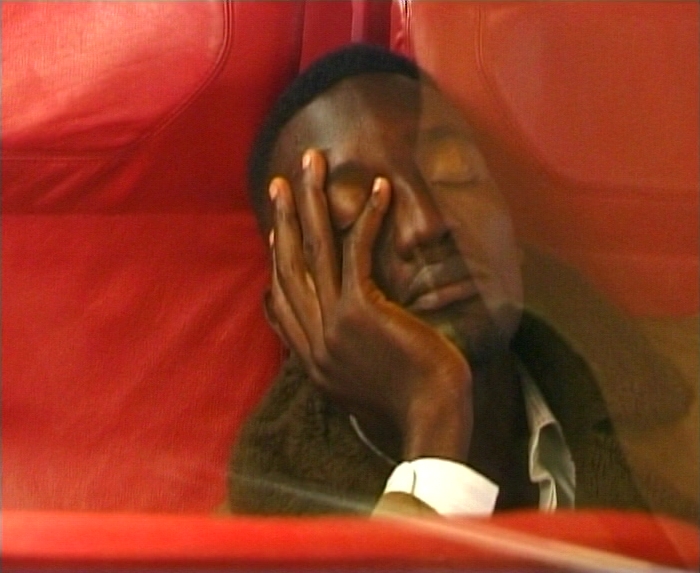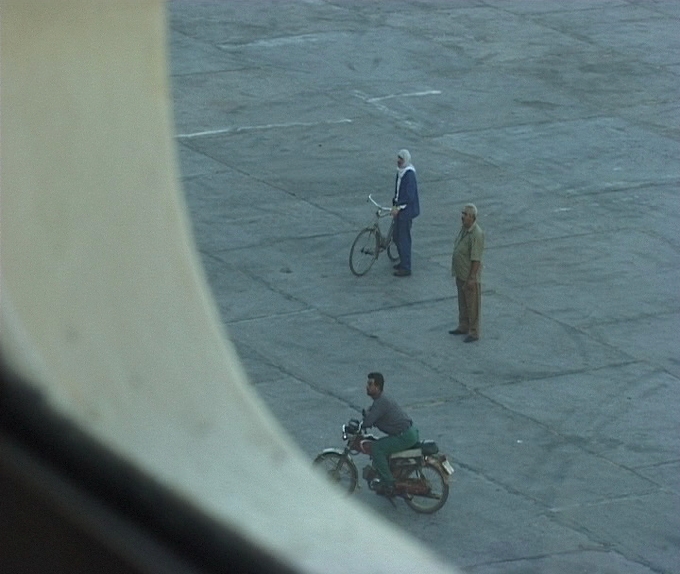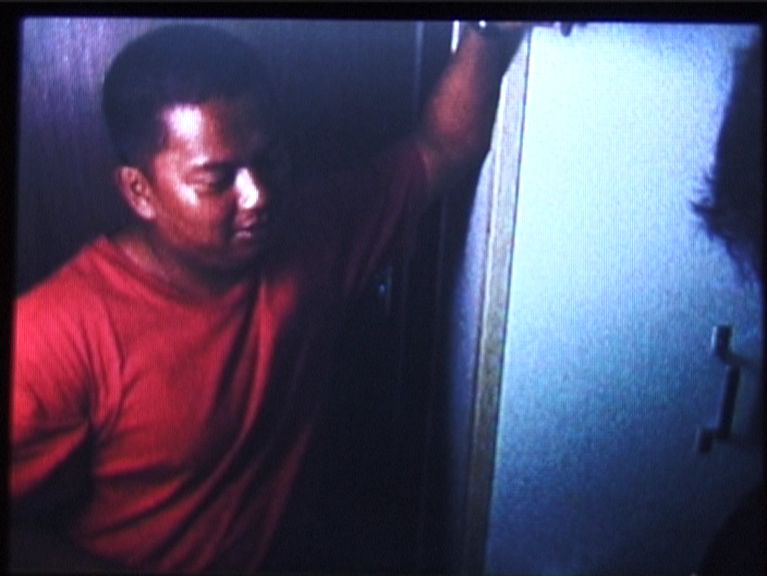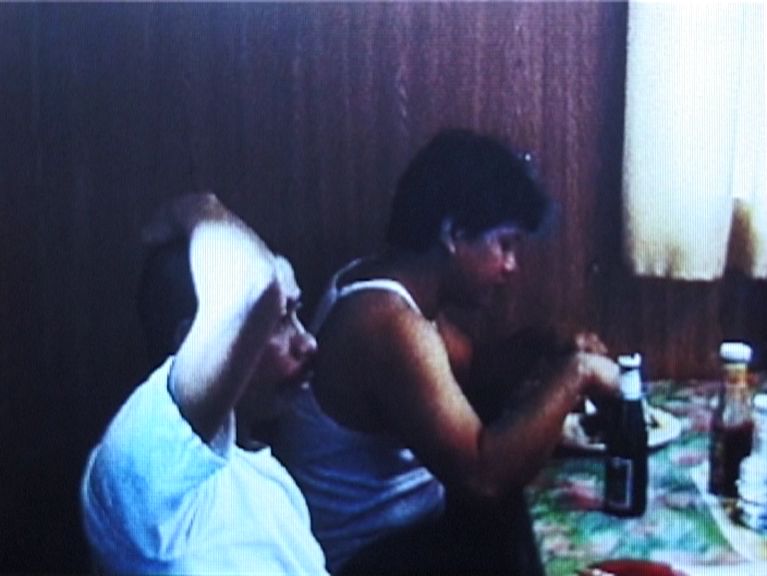
Cargo
Synopsis
Cargo is the story of a journey that I made on a container ship with a group of Rumanian, Polish and Filipino sailors, who were delivering cargo to the Middle East. I stayed on the ship for several weeks. Most of the sailors weren’t allowed to leave the boat and they spent their days waiting, singing karaoke and telling me stories in a small TV room. In Syria, the ports were military zones. I hid at a porthole and secretly filmed the life below: a man stealing wood, a soldier fishing off the edge of an abandoned submarine. Later, I made a narrative, that falls between reality and fiction. It was a way of showing the limbo that these men were living in.
Laura Waddington, 2001
On the making of Cargo
We had been in Syria and were now floating at sea, the sailors sleeping. I went out on deck and sat amongst the containers. They had been hot, exhausting days, the sailors obliged to work with decrepit and malfunctioning loading equipment. Shortly before I’d boarded the ship, two of the crew, sleepless and overworked, had been crushed by falling containers, as they unloaded cargo there. A voice had come over the satellite radio, ordering the ship to carry on its endless journey and they had had to abandon their paralyzed shipmates in a hospital, with promise to return later.
Read related passage in Scattered Truth

Press quotes
“For this writer, film of the festival was Laura Waddington’s Cargo, an atmospheric and melancholy personal journey by merchant ship and a perceptive analysis of the emotional cost of globalisation.”
Gareth Evans, Sight and Sound, London
“Cargo is nothing less than dazzling. Visually, it’s superb (the dreamlike images, the work on time, the hallucinatory colours) but most of all, through her voice over, she gives these men an exemplary humanity and dignity.”
Olivier Nicklaus, Les Inrockuptibles, Paris
Read article: Les yeux de Laura (English translation)
Read article: Les yeux de Laura (French original)
“A powerful adventure on the Mediterranean with undocumented sailors, by one of the most brilliant and courageous filmmakers of her generation, worthy heir to Henri Storck, Paul Strand, Marcel Hanoun.”
La Cinémathèque Française, Paris
“The ARTE Prize for a European short film goes to Laura Waddington’s Cargo, a lyrical voyage on the Mediterranean depicted in a series of distended moments. Combining diaristic text with painterly visuals, the director recounts a dialogue between a mute woman and the forgotten men who work on a cargo ship. We are drawn into a nomadic journey at the frontier of European consciousness; a reflection on what it means to be a citizen without country, to drift without destination. In this way, Waddington opens up a broader reflection of the nature of human identity and human existence”
International Jury Statement, ARTE Prize for Best European Short Film, 48th International Short Film Festival Oberhausen
“Lost in Space: Poetic and exquisitely beautiful, Laura Waddington’s dream video diary records the melancholy shadow life of a container ship in perpetual limbo.”
8th New York Video Festival, Film Society of Lincoln Center program notes
“In Cargo there is again a chosen limit: She boards in semi-secrecy a ship bound for the Middle East. From her cabin she records the journey trying to save a few traces, a few images of the ships loading and unloading … What she records most of all is the difficulty of only being able to live the world by moving across it and withdrawing from its tumult.”
Bouchra Khalili, The 51st International Short Film Festival Oberhausen Catalogue, Germany
Read catalogue essay: The Pain of Seeing (English translation)
“For the stamina of personal vision which dares to find in the everyday glimpses of a rare and sublime passion, for understanding that these pictures have to be lived before they are produced, for its enclosed travelogue of barely met desires and palpable longings, for sharing its loneliness and the small hole we each peer through named the personality, which is also here the camera, the filmmaker herself no longer framing but framed, for opening into a world that was closing all around her the prize goes to Cargo by Laura Waddington”
International Jury Statement, First Prize ex aequo, Videoex 2002 – International Experimental Film and Video Festival, Zürich
“On with Cargo to the enclosed spaces of journeys by ship in the company of some of the most wretched human beings on earth, seaman whose working=living conditions have considerably worsened in the last 20, 30 years.”
Olaf Möller, 41a Mostra Internazionale del Nuovo Cinema Pesaro Catalogue, Italy
Read catalogue essay: The Days and Years of My Travels (English original)
Read catalogue essay: The Days and Years of My Travels (Italian translation)
“And they were living like prisoners, without the papers to go ashore,” the voice-over tells us. “It was as if we lived the world with the curtains drawn.” So much so that, even though the movement here is physical, the artist produces in her film narrative more of a mental journey, woven into this interstice of suspended time, conveying the feeling of abandonment that she bears witness to.”
Marion Hohlfeldt, Journal d’Exposition: Galerie Art & Essai, no. 12, Rennes
Read essay excerpt: Alternatives to Memories (English translation)
Read essay excerpt: Alternatives to Memories (French original)
“The ship appears, in analogous fashion to Zone, as a liminal space in which individuals assume different natures than how they would behave on land. The ship escapes the ordinary and predictable world and thus—as Michel Agier writes of refugee camps—is no longer a place, but a “mere space”. “What survives and becomes stronger when people are obliged to abandon all that had previously defined them?” is the question that the filmmaker herself poses during her stay there.”
Cecilia Bima, Lacune visive: Bassa definizione per un’etica della testimonianza
Read chapter : Cargo: distanza e lacuna, luoghi di produzione del sensibile (English translation)
“Watching the film now, I realise that it is about a woman looking at men, and that the film could not have been shot by a man. It is there from the onset, in the narrator’s voice and in something about the slowness of the narrative, which I can’t entirely define.”
Peter Kremski, Ohne DV Wäre Meine Arbeit Gar Nicht Denkbar’: Ein Gespräch mit Laura Waddington
Read interview: ‘Without DV My Work Would Be Unthinkable‘ A Conversation with Laura Waddington
“To once again quote Waddington: “What did the periphery tell us about our over lit centre and all of us who inhabit it?” It is the periphery that interests the director, the decentralized zone where, however, exchanges—often illegal—take place, the loading and unloading of cargo, conversations and thefts.”
Cecilia Bima, Lacune visive: Bassa definizione per un’etica della testimonianza
Read chapter : Cargo: distanza e lacuna, luoghi di produzione del sensibile (English translation)
“Laura Waddington’s art goes beyond merely bearing witness to reality. Whether she is scrutinizing the shadows … or focusing on the faces of men adrift (the sailors of Cargo seem to have stepped straight out of a novel, a feeling heightened by the tone of the voice-over), her video camera transports us to a dimension where time no longer holds sway. It is a sensory experience during which we become sailors without a port or refugees of the night. Ghosts wandering over the surface of our Earth.”
Pascal Mieszala, Plan Rapproché, no. 100, Vendôme
Read interview: Laura Waddington: La vidéaste de l’errance (English translation)
Read interview: Laura Waddington: La vidéaste de l’errance (French original)
Awards
- ARTE Prize for Best European Short Film, 48th International Short Film Festival Oberhausen, Germany
- First Prize ex aequo, Videoex 2002 – International Experimental Film and Video Festival, Zürich, Switzerland
Selected Film Polls and Best-of Lists
- “Nicole Brenez’s 50 great avant-garde films/events 2000-2009.” In “Best of the Decade: Avant-Garde, 2010.” Film Comment, New York
SELECTED SCREENINGS AND EXHIBITIONS
- 30th International Film Festival Rotterdam, the Netherlands [world premiere]
- 8th New York Video Festival, Walter Reade Theater, Film Society of Lincoln Center, New York, US
- 30th Montreal International Festival of New Cinema and New Media (FCMM), Canada
- 45th London International Film Festival, United Kingdom
- 19th World Wide Video Festival, Amsterdam, the Netherlands
- 48th International Short Film Festival Oberhausen, Germany
- 3rd Jeonju International Film Festival, Korea
- One World: 4th International Human Rights Film Festival Prishtina, Kosovo [organised by Council for Defence of Human Rights and Freedoms (CDHRF), Kosovo]
- 14th Ankara International Film Festival, Turkey
- ISEA 2002, International Symposium on Electronic Arts, Nagoya, Japan
- 51st Sydney International Film Festival, Australia
- The Age of Migration, The 54th Robert Flaherty Film Seminar, New York, US
- DIG.IT Festival of Digital Media, Walker Art Center, Minneapolis, US
- Cinémathèque de Tanger: Explorations in Film and Video, The Photographer’s Gallery, London
- Outside In: Alternative Narratives in Contemporary Art, University Museum and Art Gallery, The University of Hong Kong, Hong Kong, China
- elles@centrepompidou: Artistes femmes dans les collections du Musée national d’art moderne, Centre Georges Pompidou, Paris, France
- La Intratable Belleza del Mundo, Centro de Arte Contemporáneo Wifredo Lam, Cuba
- Centre Pompidou Collection Nouveaux Médias, Institut français d’Izmir, Turkey
- Vidéo et après : Laura Waddington, Musée National d’Art Moderne, Centre Georges Pompidou, Paris, France,
- Laura Waddington, Mostra Video Itau Cultural, Palácio das Artes, Belo Horizonte, and Instituto de Artes do Pará, Bélem do Pará, Brazil
Read Full Screenings and Exhibition List for Cargo
CollectionS
- Musée National d’Art Moderne, Centre Pompidou, Paris, France
- International Film Festival Oberhausen, Film and video archive, Germany
- The International Film Festival Rotterdam, The Netherlands
- Musée national de l’histoire de immigration, Paris
- Allan Sekula Archive, The Getty Research Institute, Los Angeles, US
- Bibliothèque de l’Université Laval, Quebec, Canada
- It’s Hard to Touch the Real archive, Grazer Kunstverein, Austria
- Cinémathèque de Tanger, Morocco
- Bibliothèque de l’Ecole supérieure des Beaux-Arts, Nimes, France
Back to top

